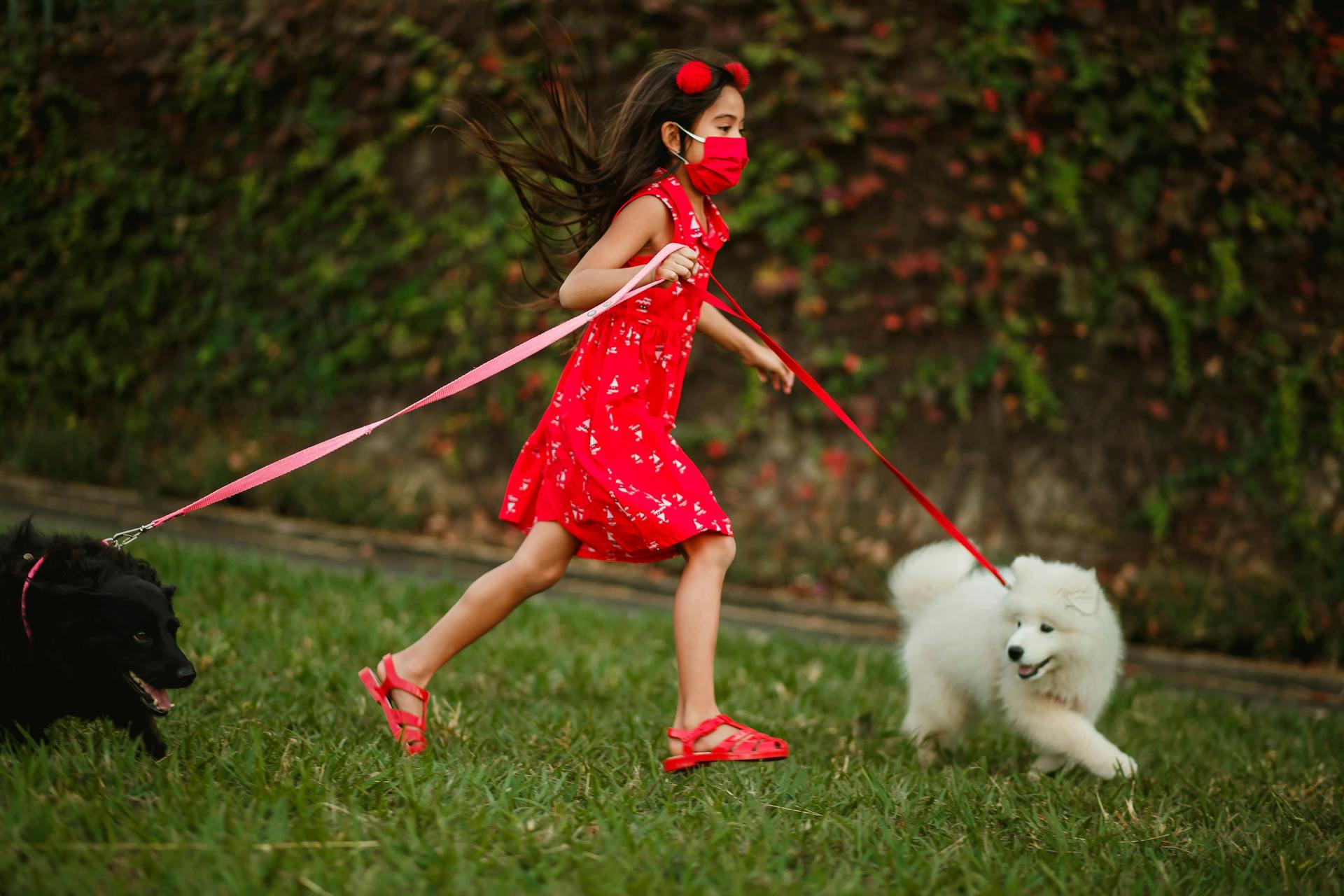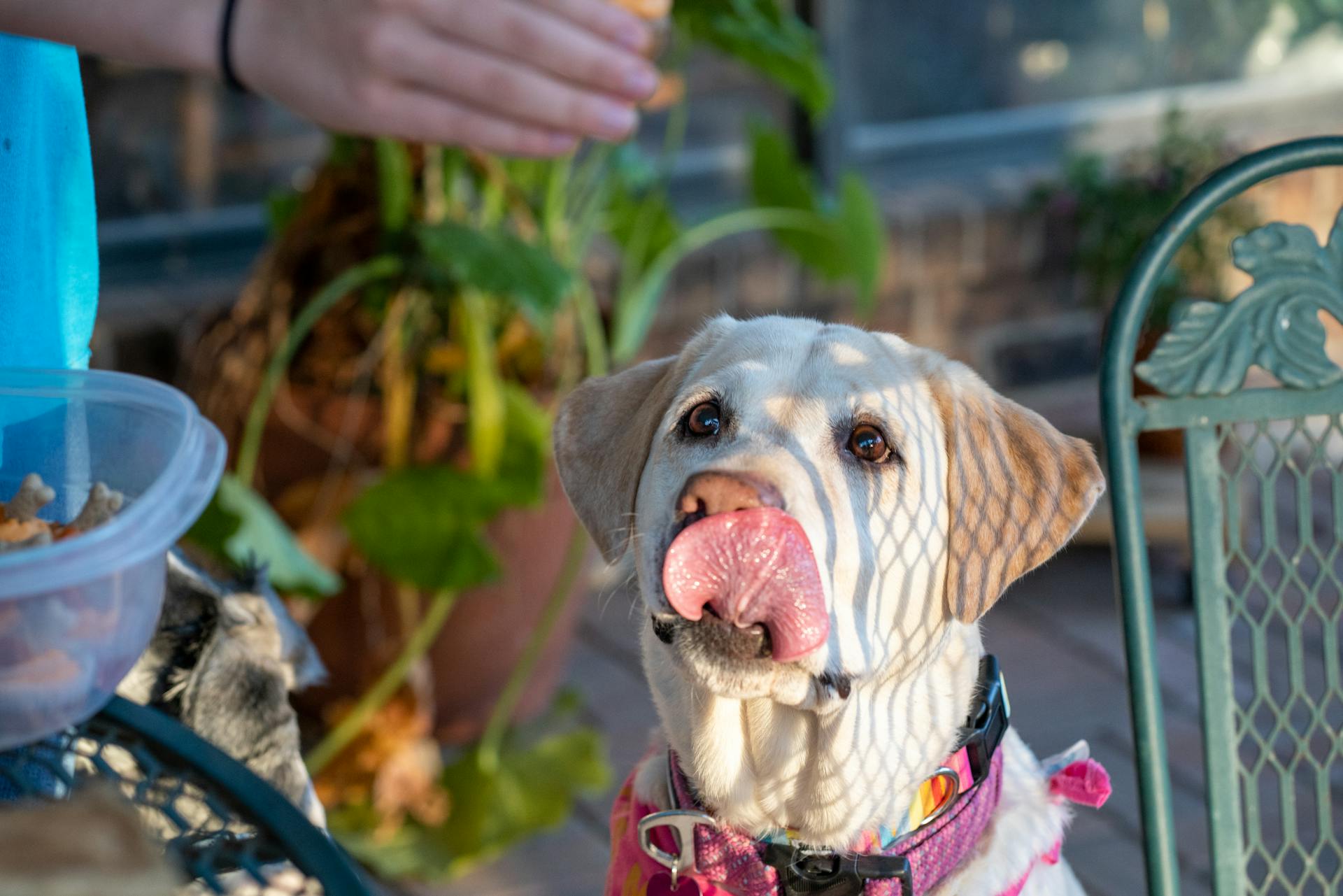
Kennel cough is a highly contagious respiratory disease that affects dogs of all ages and breeds. It's often spread through the air when an infected dog coughs or sneezes.
Dogs can also pick up kennel cough by coming into contact with contaminated surfaces or objects, such as food and water bowls, toys, and leashes.
Kennel cough can be spread through close contact with an infected dog, including touching, grooming, or playing with them.
On a similar theme: How Fast Does Lymphoma Spread in Dogs
Causes of Kennel Cough
Kennel cough can be caused by a variety of airborne pathogens, including Bordetella bronchiseptica, canine parainfluenza, and mycoplasma.
Typically, a dog needs to be exposed to multiple pathogens at once to develop kennel cough, which is why it's often found in environments where dogs are in close proximity to each other.
Dog parks, dog shows, frequent travel, and kennels are all high-risk areas for kennel cough due to the concentration of dogs and potential for exposure.
Dogs that stay at home most of the time are less likely to develop kennel cough.
The pathogens that cause kennel cough can survive for a long time in the environment, making it possible to spread the infection even without direct dog-to-dog contact.
Infectious organisms like Bordetella and parainfluenza can be found in moist, warm environments with poor ventilation, which is why kennels and shelters are often breeding grounds for kennel cough.
Any dog exposed to one of these pathogens can be infected, but repeated exposure in a crowded environment increases the likelihood of transmission.
Even a simple exposure, such as a quick meeting at a dog park, can be enough to transmit the infection.
Related reading: How Long before Kennel Cough Symptoms Show
Prevention and Protection
To prevent your dog from getting kennel cough, ask your vet about vaccinating your pet. Vaccines are available in injection, nasal mist, and oral medication forms.
While vaccines can help prevent kennel cough, they're not 100% effective since the disease can be caused by many different pathogens.
If your dog spends time with other dogs, your vet will recommend the best form of the vaccine for your pet.
To protect your dog from CIRDC, make sure they're up to date on their recommended vaccines, including adenovirus and parainfluenza.
If your dog is around other dogs regularly, they should also get a parainfluenza vaccination at least once a year.
Bordetella vaccination is highly recommended for dogs that are at higher risk, such as those that go to dog parks or daycare.
To stay informed about canine disease outbreaks in your area, consult with your veterinarian or check veterinary school websites and your state or provincial animal health departments/ministries.
In an outbreak situation, try to avoid dog group contact as much as possible, including dog parks, daycare, and boarding facilities.
Washing your hands regularly, especially after petting another dog, can also help prevent the spread of disease.
If you're planning to travel with your dog, check with your state or provincial animal health departments/ministries to see if there are any CIRDC outbreaks in your destination.
Readers also liked: Kennel Cough Even with Vaccination
Here are some key vaccination recommendations to keep in mind:
- Adenovirus and parainfluenza vaccines are essential for all dogs.
- Parainfluenza vaccination should be given at least once a year if your dog is around other dogs regularly.
- Bordetella vaccination is highly recommended for dogs at higher risk.
- Your veterinarian may also recommend vaccination for canine influenza, depending on your dog's lifestyle and environment.
Understanding Kennel Cough
Kennel cough is a contagious respiratory disease that affects dogs, and it's essential to understand how it's spread to keep your furry friend safe. Kennel cough can be caused by a combination of airborne bacteria and viruses, including Bordetella bronchiseptica and canine parainfluenza virus.
Dogs that spend time with other dogs, especially in crowded areas like dog parks or kennels, are more likely to develop kennel cough. In fact, a dog is much more likely to be infected in a moist, warm environment with poor ventilation, such as a kennel or shelter.
Some common culprits behind kennel cough include canine parainfluenza virus, canine adenovirus type 2, and Bordetella bronchiseptica. These pathogens can be found in the air, on surfaces, and even on other dogs.
Here are some of the organisms that can contribute to kennel cough:
- Canine parainfluenza virus
- Canine adenovirus type 2
- Bordetella bronchiseptica
- Canine respiratory coronavirus
- Canine herpesvirus-1
- Canine distemper virus
Dogs with weak immune systems, such as puppies, dogs with immune-mediated disease, or dogs on immunosuppressive drugs, are more likely to require intensive therapy and have a poorer prognosis.
How Does a Dog Get Circumcised?

Dogs can get circumcised, but it's not related to CIRDC. Circumcision is a surgical procedure to remove the foreskin, and it's not a common practice in dogs.
CIRDC is a different issue altogether, and it's a contagious disease that dogs can spread through casual contact. Dogs can transmit CIRDC through respiratory droplets, such as from a cough or sneeze.
Dogs may never show signs of disease, but they can still spread CIRDC. This is because the infectious organisms can survive for a long time in the environment.
Certain factors increase the likelihood of your dog contracting CIRDC, including stress, poor ventilation, and crowded conditions.
Frequently Asked Questions
Can a dog get kennel cough without being around other dogs?
While kennel cough is often spread through dog-to-dog contact, it can also be transmitted through airborne droplets or contaminated objects, making it possible for a dog to get kennel cough without being around other dogs
Can a dog get kennel cough in one day?
Yes, a dog can develop kennel cough as early as one day after exposure, but it typically occurs within 2-14 days. Early symptoms may appear sooner, so monitoring your dog's health closely is essential.
Can dogs get kennel cough from the ground?
Yes, dogs can get kennel cough from brief contact with an infected surface, such as a bush or sidewalk. Kennel cough can survive on surfaces for up to 30 minutes, making it a highly contagious and easily transmissible disease.
Sources
- https://www.avma.org/resources-tools/pet-owners/petcare/canine-infectious-respiratory-disease-complex-kennel-cough
- https://callananveterinarygroup.com/what-is-kennel-cough/
- https://www.guilfordjamestownvet.com/site/blog-greensboro-vet/2024/02/15/dog-kennel-cough-symptoms
- https://resources.bestfriends.org/article/kennel-cough-dogs-symptoms-treatments-vaccine
- https://affordablecareveterinaryclinic.com/news/the-facts-about-canine-infectious-respiratory-disease-complex-kennel-cough
Featured Images: pexels.com


